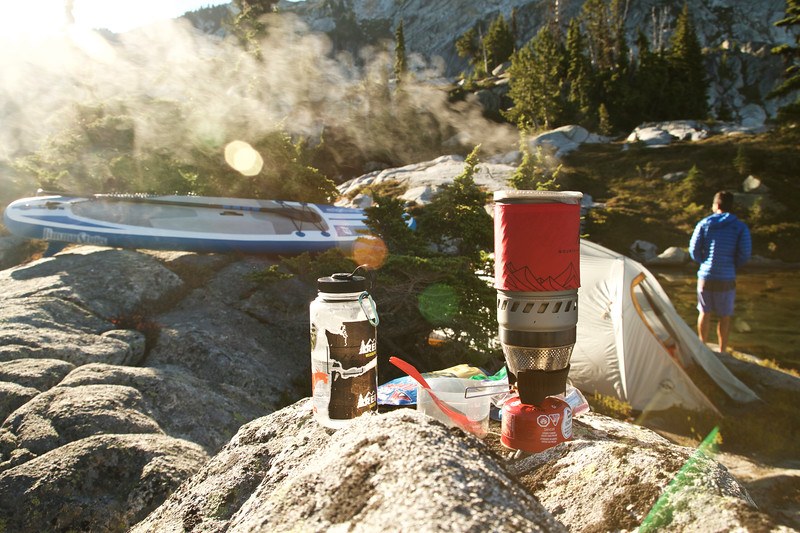
So you're vegan - no meat, no fish, no dairy. Whether you do it for your health, the environment, or animals rights reasons, it's not always convenient to have a plant-based diet. This is especially true in the world of backpacking, where beef jerky is its own food group. But I have good news- it's entirely possible to eat vegan and eat well in the backcountry. All it takes is a little extra planning and a lot of legumes. Consider these tips the next time you hit the trail:
Protein, fiber, and calories
Making meals with a lot of these 3 things will keep you fuller, longer. Any meal with too much of one or the other will usually leave you hungry or with an upset stomach.
Avoid the vegan 'crutches'
Avoid the classic vegan crutches of simple starches and sugary foods. Treating your body well will allow you to hike longer and harder. Save the Oreos for around the campfire, not as an emergency lunch.
Mix it up
It’s easy to pack the same meal for 4 days in a row, but much harder to eat it. Balance your pack between well-packaged home cooked meals and the usual grocery store vegan staples. The upside is that you can use reusable packaging for your homemade meals, reducing plastic and your carbon footprint.
Implementing these tips into your backpacking trip is easier than you would think. Below are ingredients, meal options, and prep suggestions to make your trail food something to look forward to.
grains
Quick Cook Quinoa
Quinoa is a complete protein, pairs well with most dishes, and is more appetizing than having another bowl of brown rice. Consider quick cook quinoa, ready in 5 minutes on your camp stove.
Whole Wheat Tortillas & Bagels
The staple starches of backpacking. Opt for whole wheat - when you're vegan, cheesy jalapeño is out anyway.
Oatmeal
Another backpacking classic. Consider Bob’s Red Mill Oat Bran - it’s inexpensive and has a porridge texture, avoiding the taste of half-cooked oats. Oats are high in protein and fiber to get your morning going.
Quick Cook Brown Rice
To pair with your dehydrated beans, of course! Rice will take longer to cook than quinoa, but it’s cheaper and a quick cook option will still be ready in about 10 minutes.
Fats & Fiber
Peanut butter
A standard for a reason - throw it in your oatmeal, on a tortilla, or eat it plain. Alternative butters like almond, sunflower, and cashew butter are also great, calorie-dense spreads for those with allergies, or if you’re already sick of peanut.
Coconut Oil
Coconut oil is high in fat and has a high smoke point, making it a great camp oil to cook with when you want to keep calorie counts high. It also solidifies in temperatures under 76 degrees, so you don't need to worry about it leaking in your bag on cooler trips. Add a spoonful to premade meals as well for a boost in fat and calories.
Dehydrated fruit
Less messy than jelly and with more fiber. Can be eaten in your oatmeal, on a wannabe PB&J, or in your trailmix.
Dehydrated veggies
You can’t neglect your vegetables on a plant-based diet. Buy a couple different mixes for each of your planned meals; this will help add variety and make your backcountry cooking slightly more palatable. For chili, use a mix with more corn and tomatoes. For soups and scrambles, opt for something with more onion and carrots.
Tube of tomato paste
You’ll probably be eating a lot of beans, and tomato paste is a necessary addition to campfire chili. It can also be used as a base for spaghetti if you manage to pack along some pasta.
Dehydrated hummus
For the bagels! Hummus is also more calorically dense than you’d think.
Protein
Dehydrated beans
Heavy on protein, fiber, and calories, beans are the go-to choice for backpackers, meat-free or not. This is why every other camp recipe is chili related. Try and get dehydrated refried beans as well as pinto or black beans, depending on your need for variety and the length of your trip. Pair it with rice to get the amino acids needed to make a complete protein.
Smartdogs
Smartdogs give you 13 grams of protein per serving without the oil and mess of most fake meat products. Be sure to buy the jumbo dogs - the cost is lower, and you’d eat two of the little ones in a single serving anyway.
Tofurkey Deli Slices
Tofurkey arrived early to the meat-free game and has survived decades as a Thanksgiving punchline. They’ve whipped out a few great products in that time, and their deli slices are no exception; they're also juice-free and are great for lunch or chopped into the evening chili. The hickory smoked flavor is the best. Be sure to eat your faux meat products on day one (day two, max) of your trip to avoid spoiling.
Snacks
Plantain chips
Less sugar than banana chips, but they still give you some starch and fiber for a quick snack.
Primal strips
Primal strips are vegan jerky, packing about 10 grams of protein each as a quick, mess-free snack.
Energy bars
GoMacro, Kind bars, and LaraBar are great go-to choices. Be careful with the chocolate coated Kind bars though - they melt quickly in a pack, leaving sticky fingers for dirt to cake to. Grab one of the vanilla or coconut flavors instead. If you're headed to a cold climate and melting is not an issue, the peanut butter flavor packs the most protein.
Trail mix
Another backpacking basic for a reason. Avoid cheaper mixes that are heavy on peanuts, because you’re already going to be eating an insane amount of peanut butter.
Seasonings
Garlic salt
Gives a serious boost to whatever you’re cooking up that night.
Nutritional yeast
Never skimp on nooch, even in the backcountry. Bragg’s is the gold standard.
Hot sauce
Great to add to chili, veggies, or soups. Consider a kitschy Sriracha key chain.
Veggie bouillon cubes
Add to anything savory that needs to be rehydrated- beans, rice, quinoa, and more. Just don’t add to premade meals as it will more than double the salt content.
Meal Prep
Home cooked meals will require the most prep, but will also hit the mark for being the most satisfying with the least amount of time messing with a camp stove. It can be a little heart-wrenching to make a meal and see it dry up in the oven, but it'll be well worth it when you warm it up on the trail. Consider these recipes for chana masala and bulger chili as a starting place.
Pre-Packaged Meals
For premade meals, it’s tricky finding something that meets the need for calories, protein, and fiber and also tastes acceptable. Here are a few options to consider to supplement your other dishes, or for when you know you’ll be too tired to make anything else.
- Hearty Texas Beefish Stew
- Organic Green Lentil Soup
- Blackened Quinoa
- Louisiana Red Beans and Rice
- Sunrise Tofu Scramble
It takes a little more planning, but packing high-quality vegan food in the backcountry can be done. You’ll probably be eating better than most of the carnivores out there, too. Happy hiking, and don’t forget your peanut butter.
Add a comment
Log in to add comments.Great read! From another (mostly) vegan!
 Hailey Oppelt
Hailey Oppelt
